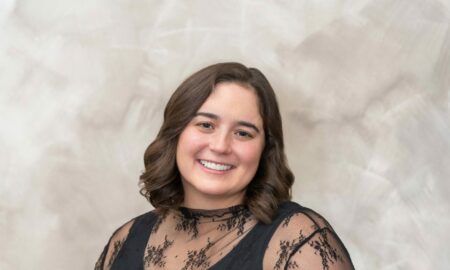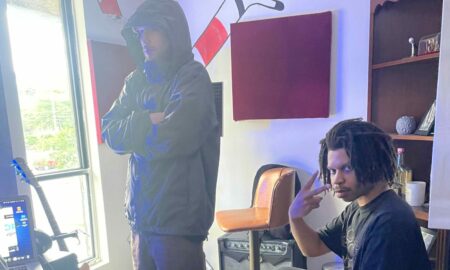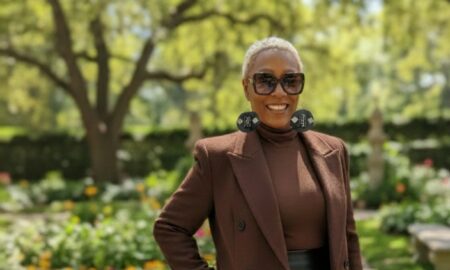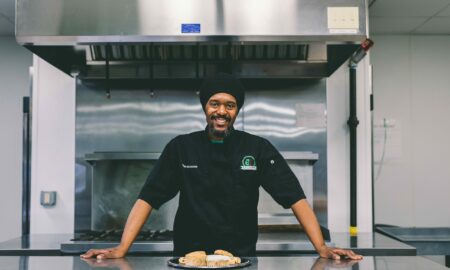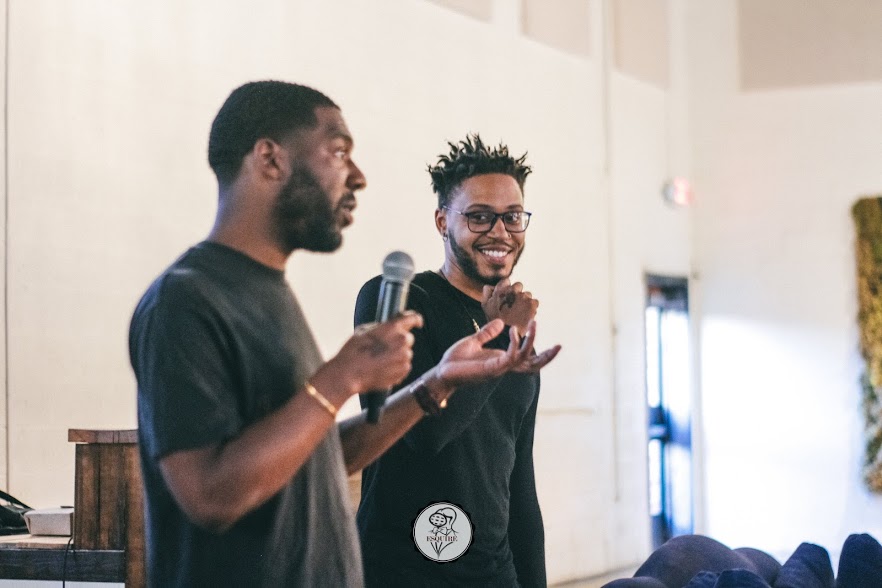

Today we’d like to introduce you to Donte Miller and Nathan Jones.
Donte and Nathan, let’s start with your story. We’d love to hear how you got started and how the journey has been so far.
Our story began in the summer of 2013 in New York City. After countless hours of studying and many sleepless nights, Donte and Nate had earned the two spots amongst 250,000+ applications to be interns at Goldman Sachs. At the time, Nate was a rising senior at Morehouse, working his second summer with the bank, and Donte was a rising junior at Morehouse, working at Goldman for his first summer.
The experience that Nate, who comes from the South Dallas town of Desoto, and Donte, from Greenville, South Carolina, had at the bank was both a technical and cultural awakening. We spent lots of time meeting new friends and understanding the theory and application of finance. One very late night after spending a full day focusing on one aspect of a company’s financials, Nate and Donte reflected on their backgrounds and about what they were doing and how it did not seem to have any direct impact on the “real people” who played such a massive role on where we were.
We just knew that if we put the same amount of rigor and focus that we did at work on the small businesses in our communities back at home and in similar neighborhoods across the U.S., we could create a world of change. Over the course of the summer, it was that thought that evolved into the early stages of the Village Micro Fund or VMF. Once we returned to Atlanta after that summer ended, we put the idea into action. We reached out to our friends from the summer who went to school in Atlanta and classmates from school who also had really rich summer experiences and would be willing to provide technical assistance to small business owners in their community. We got our first logo (Thanks Ben!), held our first meeting on the Morehouse campus.
The people who came to the meeting wanted to do whatever they could to support small business in West Atlanta, either with skills-based volunteering or through shopping. And soon, three of us started to realize what the “village” could become. After two months or so we got our first client: Ricky Pulley, a religious studies student and budding chef who was known around campus for baking and selling cupcakes. His company is called, The Cupcake Tailor.
Ricky came to Donte and said, “Look, man, I don’t know if I’m making money or losing money, I just know people love my cupcakes.” Over the course of about two months, we helped Ricky find his unit costs across his cupcakes, formalize his relationship with school vendors, better tell his story to the community, and set his prices to the market.
He started to sell his cupcakes at the majority of the student and school hosted events on campus and earned a lot more money from his sales. Over the course of that year, we worked with 5 more student entrepreneurs and continued to share the idea of VMF with local merchant associations and city officials throughout Atlanta. We got our first bit of attention across the country and consequently, we were invited to speak at UC Berkeley about our experiences with other student-led micro finance groups.
Although we couldn’t fully express it yet, we knew we were doing something right. We thought to ourselves, ‘Who’s better equipped and more willing to make a change in our community than us?’ With that thought in mind and graduation quickly approaching, Nate—who was a senior—decided to forgo working at Goldman in order to stay in Atlanta and continue building the Village with Donte and Rob. In the summer of 2014, we got our 501(c)(3) status and hosted our first small business workshop in partnership with the West End Merchants Coalition and our local councilwoman.
The workshop was a free two-day weekend session where we called on our village of friends from Suntrust, Kabbage, Twitter, Human Capital Theory, Avid Entrepreneurship, as well as students from the school who were focused on building a better business in the West End of Atlanta. The workshop was attended by about 15 entrepreneurs and we started to see the big pain point—access to capital. We always knew that was the issue.
The three of us had each intimately experienced the effects that a lack of access to capital could have on an entrepreneurial community. We had witnessed stagnant economic development in our communities back home, particularly in light of the fact that we originally (and still) wanted to start a bank.
Those experiences back in our hometowns were no different from our new home in Atlanta, but now we had the ability to do something about it. We knew we had to figure out a way to get money to deserving businesses that just needed a little help to be great. Then we met Keitra Bates, the owner of the Westview Pizza Cafe, or WVPC, at our first small business workshop. She is an entrepreneur and community leader that just gets it. She started WVPC—an organic pizzaria in a low-income neighborhood that sources organic produce from local urban farmers, educates patrons on healthy food options, hires re-entry workers, and teaches them how to run their own businesses.
Her restaurants serve as a community meeting spot for neighborhood organizations and parties. Keitra needed help reaching new customers and raising money for a new oven and a liquor license. Over the course of two months, our core team (which now included Scooter Taylor and Taylor Harris!) and a host of other villagers, connected her to the AUC student community, rebuilt her businesses plan from the executive summary down to the financials, helped her tell her story, and put the plan into action. There was a flood of new customers who were attracted to what she was doing. Thus, she became a vendor at the AUC schools and with companies, we’d partnered with in the past. During the time we were working with Keitra we revisited our theory about lending.
Since the banks won’t lend in “low-moderate income neighborhoods,” we thought. ‘What if we could make sure a company was investable, then the community could invest in their own businesses?’ We were dreaming of cooperative neighborhoods, where the community collectively invests the money needed to support the businesses they want to see and then gets paid back as they shop locally and the business grows. Wit help from our team and That’s exactly what we put into action with Keitra. We originated a loan and let the community invest in it. We hosted loan funding parties with Keitra’s customers, neighbors, parents from her kid’s school, and our friends and partners too.
Together we raised $4,000+ at 6.5% so she could purchase what she needed to grow.
While that was breathtaking, we were reminded of two really amazing things from that experience. Firstly, it was that every time we came back to WVPC to check in, an investor was at the pizzeria. People felt ownership; they were choosing to shop there instead of Dominoes or Papa Johns. Secondly, there were residents from the Westview community was just as frustrated with the lack of development as we were. After investing, one resident went on a tear around the restaurant saying, “We need a taqueria on the is street, and a clinic and coffee shop. We can do it.” He got exactly what we were trying to accomplish, a community where residents can choose and finance what they want in their neighborhood.
Every month Keitra makes a payment on her loan to us, and every quarter the investors get an email with an update on their investment, and a text that says “you made $X from your investment in Westview Pizza cafe.”Unbeknownst to us, Keitra’s story and our model of community-directed development has been shared around the country, from Washington D.C. to Seattle. We’re blown away when people call us from out of town to hear more about what we’re doing! Most recently, we’ve started quarterly cohorts where over the course of eight weeks we and our villagers provide hands on technical assistance, advisement, and panel-style conversations with city leaders who are dedicated to building stronger businesses in our community.
For our Spring 2016 cohort, we partnered with Morehouse’s Department of Entrepreneurship and District 4 of the City of Atlanta to incubate a cohort of 10 entrepreneurs from the West Atlanta neighborhoods of English Avenue, Vine City, Ashview heights, West End, and Westview. Over the course of eight weeks, they received hands on technical assistance and panel-style discussions from our villagers at Google, Twitter, UberATL, Invest Atlanta, Fifth Third Bank, PNC Bank, Equifax, Alston Bird, Emory’s Impact Investing Group, and our councilwoman from District 4. We are focused on helping them start and run stronger businesses and connect them to opportunities around the city.
As our community grows, we’re looking to create more industry vertical cohorts, such as our farmers and food cohort that we have coming soon. Because we’ve engaged certain communities and institutions, we have rare insight into the infrastructural problems with the ecosystems, such as the fact that there are 18 african american farmers in Southwest Atlanta’s Growers Coop (SWAG), but very few of them has the capacity and resources to fill large orders.
After doing a baseline study of SWAG, we discovered that sat on collectively 26 acres, but only farmed on 20% of it with about 70-80% going back into creating compost. However, we know that if we could fundraise around the farmers, they could collectively purchase their joint needs, such as a food processing center, walk in freezers, and transportation, all while building capacity and knowledge for them through our cohort model. We see plenty of opportunities like these in our communities because we do what no one else in our position does; we looked and we cared.
We’re also in the process of fundraising right now to be able to have a pool of money that we don’t have to crowfund every loan. We chose to fundraise using a direct public offering because we wanted communities to be able to play a role in the development of their businesses.
We’re always bombarded by how great it is to pursue your passion, etc – but we’ve spoken with enough people to know that it’s not always easy. Overall, would you say things have been easy for you?
No, it hasn’t been a smooth road. Our desire to not have a burden of entry for our entrepreneurship course meant that we’d have to work with larger institutions that have vested interest in the neighborhood we work in and get them to sponsor a cohort. The issue was that we’ve only just really gained the status that makes institutions want to work with us, so the first 2 years of cohorts were done as a labor of love.
Many of the relationships we’ve formed that have been fundamental to the Village being here today were born from free labor. We face many of the same struggles our entrepreneurs face, so we understand on a more intimate level their needs. We have so much exposure and attention right now, but that doesn’t always translate into capital, and we need capital.
So, as you know, we’re impressed with Village Micro Fund – tell our readers more, for example what you’re most proud of as a company and what sets you apart from others.
We serve as educators, investors, and as an organizer of movements. While we have Wall Street and silicon valley backgrounds, we are operating under a different school of thought; that investing is not just a wall street game, but the main street game and that communities can decide for themselves what their future community looks like. What sets us apart from similar entrepreneurship organization is our cooperative mindset when it comes to investing in communities combined with our ability to organize so many different groups of people and to break silos.
We specialize in community-based small businesses with education and consulting, as well as cooperative investing and ecosystem building. We believe that the best people to solve the communities problems are the people in that community and if you empower them with infrastructure, resources, and support, they can do just that. Our job is to empower the change makers already doing great work in their communities and to give them a platform to spread the word. We are an organization that is both in and of the community.
So, what’s next? Any big plans?
Our plans for the near future is to launch our Food cohort, soon followed by an Art cohort, then a Pittsburgh Yards cohort, so we’re looking forward to hiring two new members of the Village. We’re also currently fundraising for $500,000 as well as possibly getting a home for the Village soon.
Contact Info:
- Website: www.villagemicrofund.com
- Phone: 8649088591
- Email: dmille0186@gmail.com
- Instagram: @villagemicrofund
- Facebook: https://www.facebook.com/villagemicrofund/
- Twitter: https://twitter.com/thevillagefund
- Other: https://vmf.goentrepid.com/pages/about







 Image Credit:
Image Credit:
Esquire Agency
Getting in touch: VoyageATL is built on recommendations from the community; it’s how we uncover hidden gems, so if you know someone who deserves recognition please let us know here.













